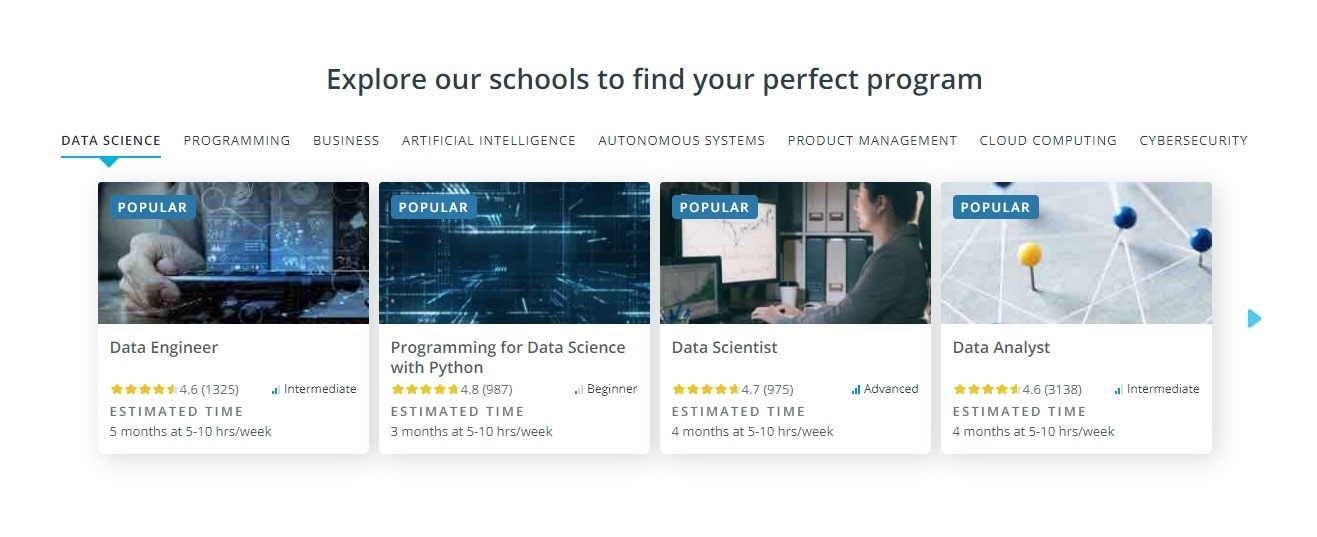As the professional market undergoes changes, courses aimed at professional training are also constantly updated to meet new market demands and the new expectations of each professional. Thus, even though there are different platforms able to offer professional courses for technology and computing professionals, each platform has its specific features and course options that better meet a certain student profile.
Among the platform options that offer online courses for different niches, the Coursera platform and the Udacity platform are two notable options. However, even though they are similar in terms of relevance to the market, the platforms mentioned differ slightly in some aspects, such as the level of specialty of the courses, the target audience served and the creation of courses offered by these platforms. Considering that both are important platforms for training professionals, but that each of these platforms adequately meets the demands of students with a very specific profile, this article discusses the main characteristics of the Coursera platform and the Udacity platform to let you know which option is best for you!
What is Coursera

Coursera is a platform specializing in MOOC courses ( Massive Open Online Courses ) that has become popular for its partnerships with the largest universities in the world. Altogether, there are more than 200 Universities around the world that collaborate with Coursera, offering qualified courses in different areas of interest.
How Coursera Works
Coursera offers courses produced in collaboration by partner universities. Thus, the Coursera platform is responsible for ensuring the user experience, hosting and delivering the course with quality, while the university is responsible for producing the course, choosing the syllabus and recruiting instructors to record the classes.
Among the different Universities that partner with Coursera, the following stand out:
- American Museum of Natural History
- Berklee College of Music
- Carnegie Mellon University
- Columbia University
- Copenhagen Business School
- Duke University
- Georgia Institute of Technology
- Imperial College London
- John Hopkins University
- The University of Chicago
- University of Florida
- University of London
In short, taking one of the courses offered by Coursera is having the opportunity to take a technical course developed by the largest universities in the world.
Who are the instructors
Coursera instructors are typically well-qualified professionals who are affiliated with Coursera partner universities. Instructors are selected by technical criteria, so it is very common to select professors from Undergraduate and Graduate courses from partner universities to teach the courses developed in collaboration with Coursera.
Coursera Prices
Coursera course prices may vary depending on course length and specialty level. But they usually cost between $29.00 and $69.00.
Coursera has Free Courses
Coursera has many free courses that you can watch as a listener. However, attending a course as a listener does not give you access to a certificate of completion. If you attend a MOOC course in listener mode and later want a certificate to prove your participation, you will need to pay for the course purchase individually to receive your validated certificate.
User experience
Being created by big names in technology and partnering with the largest universities in the world, the user experience at Coursera is always positive. Both the technical quality of the courses and the navigation options on the platform with an intuitive layout contribute to this experience being satisfactory. In addition, the content of the courses, for the most part, is quite objective and aimed at the labor market.
Coursera has Certificate
Both MOOC courses and Coursera private courses give access to a certificate. However, MOOC courses only offer certificates to those who purchase this option later, paying the certification fee. It is possible to attend many courses in the listening mode, without any cost attributed to it. But there is no certification for the listener-assisted classes until you acquire the course in question.
Coursera is worth it

Coursera is worthwhile both for those who already have a degree and want to increase their market value and for those who do not yet have short courses to acquire applicable knowledge. With courses in different areas and partnerships carried out by the largest universities in the world, Coursera represents an excellent cost-benefit ratio for professionals from different areas and levels of specialization.
Advantages (Pros) of Coursera
All major MOOC course platforms on the market have some common characteristics, such as the quality of the courses, the practicality of studying at home with flexibility and the appreciation of the curriculum for the job market. Still, when compared to other institutions that provide the same service, Coursera has important advantages in the following aspects:
- Wide range of areas of interest covered by the courses
- Courses developed by the largest universities in the world
- Free MOOC courses for listeners
- Many technical courses with great value for money
- Syllabus focused on the demands of the labor market
Disadvantages (Cons) of Coursera
Coursera’s perception of disadvantages is a very subjective aspect. As it is a comprehensive platform, that is, it has several course options and attracts students of different profiles, naturally the perception of disadvantage is influenced by the expectations and reality of the student. However, generally the negative aspects perceived by those who study at Coursera are the following:
- Does not have Nanodegree courses
- Some courses have few subtitle options
- Many courses considered superficial for certain student profiles
Main topics to study
By having partnerships with numerous renowned universities and betting on serving different niches, there are many topics to study among the courses offered by the Coursera platform, including:
- data science
- Business
- Computer science
- Information Technology
- languages
- Health
- Personal development
- Physical science and engineering
- Arts and Humanities
- Social Sciences
- math and logic
It is important to point out that each of these areas has numerous course options, with different levels of specialization and prerequisites. To get to know them, just visit the Coursera platform website.
>>> CLICK HERE AND CHECK OUT ALL COURSES
What is Udacity

Udacity is another online course platform that seeks to offer MOOC courses. The company Udacity was founded by Sebastian Thrun, David Stavens, and Mike Sokolsky in 2011, and its creation is the result of an innovative experiment carried out by Stanford University, in which Sebastian Thrun and Peter Norvig developed the online course “ Introduction to Artificial Intelligence” so that it could be offered to anyone, free of charge. It should be noted, however, that Udacity differs from the Coursera platform mainly by two characteristics:
- Target Audience: Udacity seeks to cater especially to the Technology, Computer Science and IT niches, so that all its courses are directly or indirectly linked to these areas
- Course production: unlike Coursera, whose courses are produced in partnership with major universities, Udacity courses are mostly produced by professionals linked to the platform or exceptionally hired to teach some courses
Below, we present the main features of Udacity so that you can compare it with Coursera and see which of the two platforms best suits your profile.
How Udacity works
Udacity works as a teaching platform, which offers open courses (especially MOOC courses) and Nanodegree courses, which are a differential of the platform.
Udacity’s open courses are similar, from a technical point of view, to MOOC courses on other technology platforms. However, the Nanodegree courses present a more complete experience, representing a comprehensive training, close to the experience provided by an Undergraduate course at a Higher Education Institution.
In addition to having complete theoretical classes on various topics, Udacity’s Nanodegree courses also offer the possibility of carrying out real projects, as a kind of internship in large technology companies, so that the student can complete the course with practical experience and the real ability to occupy large positions in the market.
Who are the instructors
Udacity course instructors are professionals with experience in the market. This is because Udacity greatly values the technical criteria, that is, the experience and competence of the professional in question. Thus, Udacity instructors are professionals who have proven experience and know-how to present valuable solutions to the market.
Udacity Prices
Udacity prices vary depending on the course chosen. Factors such as duration, course category and level of expertise can influence pricing. Furthermore, knowing whether the course is predominantly theoretical or has practical aspects also makes all the difference. The Nanodegree courses, which are broader training courses and have the possibility of carrying out practical activities in projects of leading companies in the market, are charged through monthly fees that cost an average of US$ 400.00 per month. On the other hand, free courses usually vary between US$ 29.00 and US$ 59.00 the total amount to be invested, and there may also be courses with different values, depending on the level of specialty and duration.
Udacity has Free Courses
Udacity’s free courses are short courses, typically at entry levels or introductory modules to full training in the Nanodegree courses. In addition, it is important to note that Udacity free courses do not have a certification option. If you take any of the free Udacity courses with certification, you will need to purchase the course individually.
User experience
Perhaps one of the biggest contributors to the Udacity user experience being so positive is the fact that the Udacity platform is very specific in its target audience. By segmenting its courses to the technology, computer science and information technology niche, the platform only attracts students who are really interested in these areas and, in many cases, people who already have experience in the market. Thus, the courses on the platform meet the expectations of students with ease.
In addition, it should be noted that the platform is extremely careful in relation to the program content of its courses, being also quite demanding with regard to the platform layout and the entire process involving the user experience. This causes the user experience on Udacity to be rated positive.
Udacity has a certificate
Udacity has a certificate, and its certificate has value for the academic market and for the professional market. However, the certificate is only available to those who fulfill all theoretical and practical requirements, in addition to being available only to those who purchase the courses. Courses attended as listeners, that is, without the need for investment, do not offer the option of certification.
Udacity is worth it

Being an extremely careful platform in terms of course content, judicious selection of instructors and enabling students to work on real projects for large companies to gain practical experience, investing in training at Udacity is certainly worth it. However, the perception of the value of the platform may vary according to its profile, especially based on the characteristics presented below.
Advantages (Pros) of Udacity
- Courses with high theoretical value taught by professionals with experience in the market
- Complete trainings (Nanodegree courses) that offer the possibility of practical experiences, working on real projects and learning to generate effective solutions for the market
- Courses that contribute to the professional’s insertion in the labor market, both for their theoretical framework and for the opportunity to develop practical experience
Disadvantages (Cons) of Udacity
- Very specific courses for select areas, not offering options for countless professionals
- Nanodegree courses with certification lower than that of an Undergraduate course at a formal higher education institution (not meeting, for example, the expectations of those seeking to invest in training to pursue an academic career)
- Courses with suggested prerequisites, which are not well used by students who do not meet these criteria
Main topics to study
Udacity is a platform focused on the areas of:
- Information Technology
- Computer science
- Data Science
- Technology
Thus, all courses on the platform are related to these niches. However, within these niches there are specific topics that deserve attention, such as:
- Artificial intelligence
- Python and JavaScript
- web developer
- Processes involving cloud systems
- data engineering
- programming in general
If you already have experience in these areas, or are curious about these topics and want to develop experience to enter the market, it is worth knowing the options for courses on the Udacity platform.
>>> CLICK HERE AND CHECK OUT ALL COURSES
Conclusion
The Udacity platform and the Coursera platform are two great references in the online course market. Both offer courses with a good level of theoretical foundation and excellent cost-benefit. Coursera stands out for being a platform whose courses are carried out in partnership with the largest universities in the world. Udacity stands out for having Nanodegree courses, which offer a more complete experience for those who want to occupy large positions in the market.
Both platforms are notable in their respective categories, and offer diverse options for students with different levels of prior knowledge. However, it is important to point out that Coursera has more options in areas of expertise, while Udacity has more options in terms of advanced level of expertise. It’s up to you to evaluate the characteristics of these two platforms and see which one is more congruent with what you are looking for for your career at this moment.
